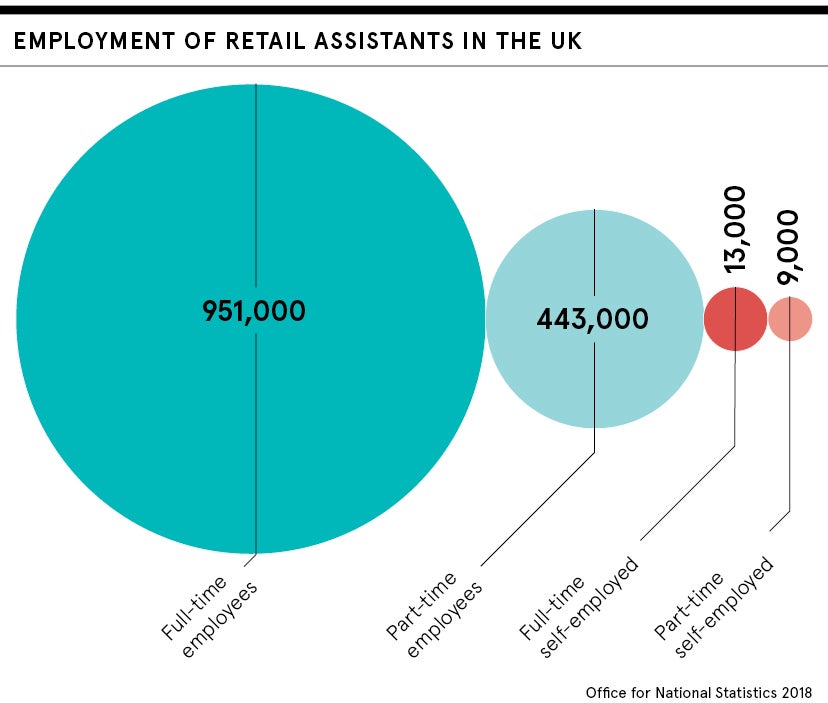Most of us, at some point, have worked on the shop floor as retail assistants. During school holidays, in-between jobs, while trying to work out what career to pursue. Perhaps it is, in part, this attitude of a temporary, passing endeavour that leads to a high turnover of store staff in the retail industry.
Latest official figures show that the average staff turnover in the UK was 16.5 per cent in 2016, a figure which includes sectors with very high turnover, such as construction and retail.
“Some people are attracted to retail because it’s flexible. It offers part-time hours, for example, so quite often, people do move on, and that’s OK. It’s pointless to fight it,” says Peter Ruis, managing director, international, at lifestyle retailer Anthropologie. “Others, like graduates, see it as a way in to the brand. At Anthropologie, we’ve had retail staff move into buying, merchandising, public relations, at junior level.”
Brands need retail assistants who put the customer first
The key is to identify retail assistants with a passion for customer service and nurture them from the very beginning. “If you get them on to a management training programme straightaway, they’re more likely to stay in the business,” says Mr Ruis. “The issue is how much they’re engaged in the business as a whole and how much the brand invests in them. If you create opportunities for them, you create loyalty.”
At Karen Millen, the womenswear retailer has invested in a new in-store app through a partnership with Mercaux aimed at equipping employees with the technology needed to deliver a better customer experience.
The app is an end-to-end solution that brings digital and in-store together to better equip shop staff, providing them with practical, real-time information on stock and deliveries. It also combines with more creative functions, such as outfit building and styling, with inspiration from marketing lookbooks and social media. After successful trials, it was rolled out to all stores last month.
With the app available on each store’s multiple iPads, retail assistants can engage customers with outfit suggestions and check availability across the Karen Millen retail portfolio and online, and place orders. Crucially, the app connects all retail employees in Karen Millen’s UK stores, so they can communicate and share ideas across the country.
“We looked at the tools we could provide that would give retail assistants the confidence and knowledge to sell,” says Karen Millen’s global retail director Louise Mitchell. “We’re looking to launch the app internationally this year. We’re also looking at how we can bring online and in-store together even more. For example, you see a dress online, but you’re not sure about the fit. So, we connect you to a stylist at store level, either by phone or video.”
Attracting and retaining talent requires flexibility and an open mind
Over the last year, Karen Millen’s approach to recruiting store staff has evolved beyond simply filling a shop-floor vacancy. “We hire people who really want to have a conversation with the customer, who want to sell, who love being with the product,” says Ms Mitchell. “They have their own blogs and strong following on social media.”
And flexibility, which has previously contributed to retail’s high turnover, is now becoming an attractive proposition for longevity. “The future of work is about being flexible; people are not having life jobs anymore,” Ms Mitchell adds. “For example, we have a great store stylist with her own Instagram following and who only works on Saturdays. Those customers know that, so that’s when they visit the store.”
How retailers choose to engage with, and thus retain, retail assistants depends on their size and type of business. Mr Ruis says: “At the premium end, you talk more to customers, you engage in conversation. John Lewis is a great example because of its pension and bonus schemes. If you’re a Tesco or M&S, the environment is more about productivity, so the opportunities are different.”

Prioritising the wellbeing of retail assistants is key
Indeed, Marks & Spencer has pledged to support its staff by providing one million hours of work-time community volunteering between 2017 and 2025. The retailer’s focus is firmly on employee wellbeing, pledging to launch an independently benchmarked health and wellbeing framework to support M&S staff on physical and mental health issues. There are plans for health and wellbeing learning and support to be included in all employability programmes by 2022, together with mental health training.
“M&S has always taken employee wellbeing seriously and we have an established wellbeing programme,” says Beth Rochford, M&S wellbeing manager. “It includes a dedicated online mental wellbeing area on our wellbeing portal with tools and materials from mental health experts designed to support M&S employees and line managers alike in both prevention and support.”
Research by the Chartered Institute of Personnel and Development and consultancy firm Lane Clark & Peacock, published in November, says employers are increasingly prioritising development and wellbeing of retail assistants, with 97 per cent of employers planning to maintain or increase spending on employee benefits over the next two years; the main internal drivers being to attract, recruit and retain employees.
M&S has also set up an employee-led group called the Buddy Network so colleagues can support each other’s wellbeing through face-to-face chats in London and Manchester, or with conference calls, as more than half the network’s members are based in stores.
Clearly, smart retailers have not placed all their eggs in a digital basket, but instead have found news ways to empower the people who engage with their customers face to face. Through technology, flexible working and a holistic approach to employees, retailers have given store staff something of true value, a career.
